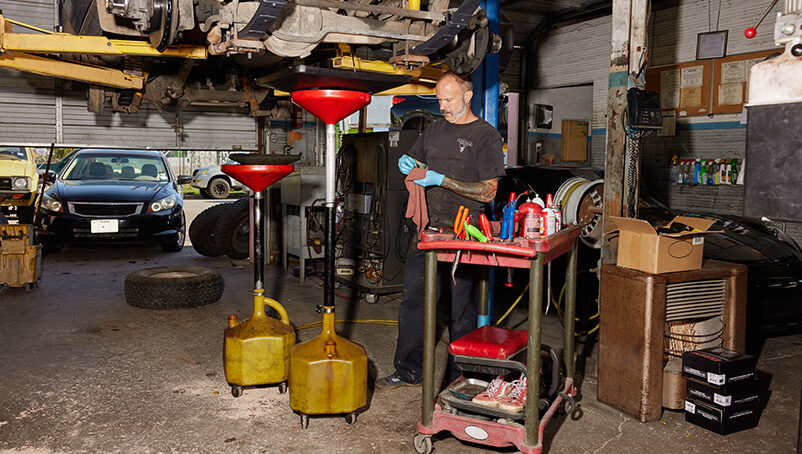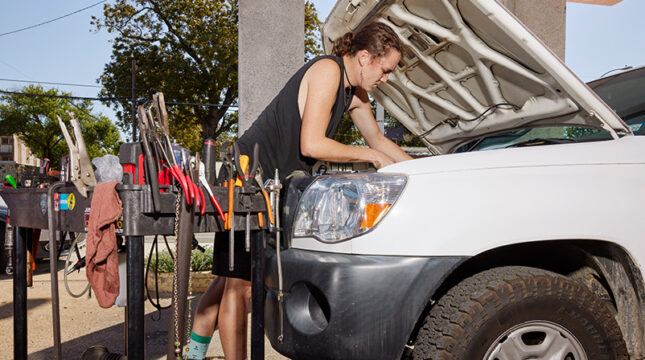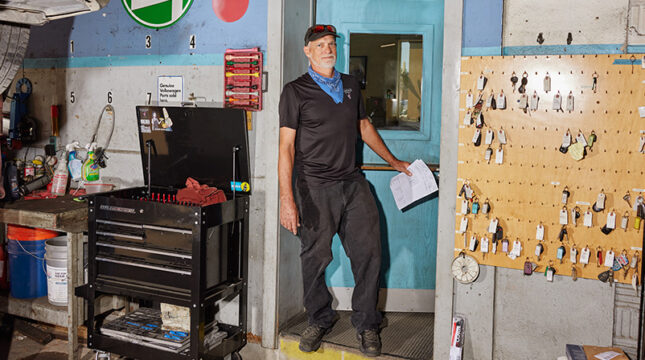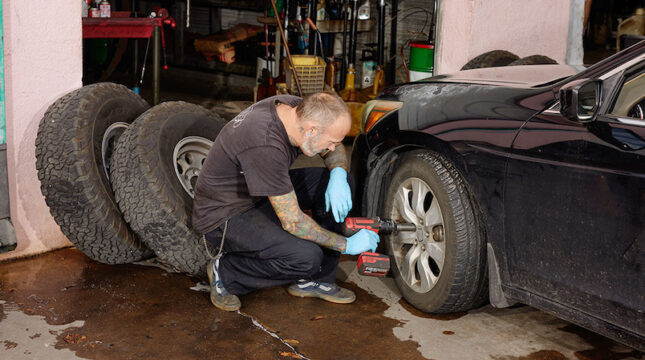What should I know about how to become a certified mechanic in the U.S.?
Although auto mechanic license requirements do not apply in every state, certification generally increases the chances of employment and may be tied to higher wages.
Additionally, formal training through post-secondary programs or trade schools contributes to better pay and more opportunities for career advancement. The most popular options for enhancing your credentials as a mechanic include:
1. ASE certification
The National Institute for Automotive Service Excellence (ASE) is one of the largest accrediting organizations for auto technicians. While mechanic licensing requirements vary from state to state, ASE certifications are widely recognized throughout the auto service and repair industry in the U.S.
To qualify for certification, auto technicians must pass a test and meet one of the following training requirements:
- Two years of on-the-job training
- One year of on-the-job training and a two-year degree in automotive repair
2. Manufacturer certification
Auto mechanics may pursue certifications to work on specific vehicle makes. For example, you could obtain a BMW or Subaru certification, making you a more attractive candidate for certain auto dealerships. Requirements vary by manufacturer but generally involve work experience, training courses and testing.
3. Refrigerant certification
The Environmental Protection Agency (EPA) requires all technicians who service motor vehicle air conditioners (MVAC) to obtain certification in proper refrigerant handling according to Section 609 regulations from the Clean Air Act.
Technicians must complete their training and certification through an EPA-approved program. This requirement applies to all auto technicians throughout the U.S. who work on MVAC equipment and does not vary from state to state.
NOTE: If your shop is certified, you can save when you bundle general liability with commercial property coverage with NEXT. Qualifying certifications are ASE, I-CAR (Gold class) and AAA-approved auto repair.
Do you need a mechanic license to open a shop?
If you decide to become a mechanic and open your own shop, you must obtain any business licenses or certifications required in your state. The exact process for how to get a mechanic license for a business varies by location, but many states have an online portal with all the information you need. Secure any licenses or permits that your city, county or state requires to operate this type of business, which may include zoning and environmental permits.
Some mechanics choose to start a mobile business, which means they provide services on the road rather than from a single shop location. Since operations are carried out differently, you may be required to register or obtain permits for a mobile business.
Generally, auto mechanics do not need a “motor vehicle dealer license” unless they are involved in buying, selling or leasing vehicles as part of their business. You should not need a license if your business strictly involves repairing or servicing vehicles and not selling them. If you start fixing and selling vehicles — such as refurbishments and restoration — you must obtain a motor vehicle dealer license to comply with state laws.
Business insurance requirements for auto repai garages
In the United States, auto mechanics are typically not required to carry insurance to obtain a license. However, certain types of coverage are required by law, such as worker’s compensation. Other types of insurance, like general liability or commercial property, mean you won’t have to pay entirely out of pocket if something does happen.
These are common types of auto repair business insurance:
Workers’ Compensation insurance
Workers’ comp insurance is required in most states if you have employees. It can help cover medical expenses and lost wages for employees who get injured or sick while working.
General Liability insurance
One of the first types of coverage small businesses get is general liability insurance, which helps cover non-employee bodily injuries or property damage. It also helps cover advertising injuries and claims of libel or slander.
Garagekeepers Liability insurance
Garagekeepers liability insurance can be included in your general liability policy to cover damage to cars you service. If you accidentally drive a customer’s car into a service bay and hit a bollard, denting the side of the car, garagekeepers liability insurance would help cover the repairs to the car’s body.
Hired & Non-Owned Auto insurance (HNOA)
Hired & non-owned auto coverage is required for longer test drives off your lot. It can also provide protection if an employee uses a personal vehicle for work. At NEXT, you can add HNOA coverage to a general liability policy.
Commercial Property insurance
If you rent or own an office space, commercial property coverage can help protect the space. This insurance helps cover damage to office space, furniture or other assets from fire, theft or natural disasters.
Business Owner’s Policy (BOP)
A business owner’s policy, or BOP insurance, provides broad coverage of general liability and commercial property policies combined in a single, more cost-efficient bundle. That means it can help cover damage that you or your employees may inadvertently cause to another person’s property and help protect your business inventory in the event of a fire or other covered event.
The state list is in alphabetical order. Find your state below to learn how to get your architecture license.
Alabama
License required: No
Auto mechanics in Alabama do not need a license to work.
If you’re an auto technician in this state, you may want to pursue ASE certification to improve your job opportunities. Some auto mechanics in Alabama receive formal training through programs at community colleges, such as Lawson State, Bevill State, Wallace State and Bishop State.
However, you must get an Alabama Motor Vehicle Dealer license to operate as a rebuilder or reconditioner.
Required business insurance in Alabama:
- Alabama requires workers’ compensation if you have five or more employees.
- If you drive for work-related tasks, you may need commercial auto coverage. Alabama’s minimum motor vehicle requirements are $25,000 per person / $50,000 per accident / $25,000 property damage.
Alaska
License required: No
No mechanic license requirements apply for auto techs in Alaska.
ASE certifications or an educational degree may help technicians accrue the skills and training needed to apply for higher-paying jobs. Programs for auto mechanics are available through several institutions, including the University of Alaska Anchorage, University of Alaska Southeast and University of Alaska Fairbanks Community and Technical College.
Required business insurance in Alaska:
- Alaska requires workers’ compensation if you have employees with limited exceptions.
- If you drive for work-related tasks, you may need commercial auto coverage. Alaska’s minimum motor vehicle requirements are $50,000 per person / $100,000 per accident / $25,000 property damage.
Arizona
License required: No
In Arizona, auto mechanics do not need to obtain a professional license.
However, some service and repair technicians may become certified or complete a formal training program to improve their odds of getting hired and earning a higher salary. Several schools, including the Arizona Automotive Institute, Mesa Community College, Pima Community College and East Valley Institute of Technology, offer programs that prepare students for ASE certification.
Depending on your operations, you may need to obtain certain permits through the Arizona Department of Environmental Quality.
Required business insurance in Arizona:
- Arizona requires workers’ compensation if you have one or more employees.
- If you drive for work-related tasks, you may need commercial auto coverage. Arizona’s minimum motor vehicle requirements are $25,000 per person / $50,000 per accident / $15,000 property damage.
Arkansas
License required: No
Auto mechanics in Arkansas are not required to be licensed by the state.
Those who wish to obtain training for this profession often pursue ASE certification or complete a vocational training program. Educational institutions like North Arkansas College, Arkansas State University Newport and Arkansas Tech University offer degree or certificate programs to prepare students to work as auto service and repair technicians.
Required business insurance in Arkansas:
- Arkansas requires workers’ compensation if you have three or more employees.
- If you drive for work-related tasks, you may need commercial auto coverage. Arkansas’ minimum motor vehicle requirements are $25,000 per person / $50,000 per accident / $25,000 property damage.
California
License required: Yes
In California, any individual or business that “repairs and/or diagnose malfunctions of motor vehicles” must register as an Automotive Repair Dealer (ARD) with the Bureau of Automotive Repair. This license costs $200 and must be renewed annually.
The ARD offers the following licenses and fees:
- Automotive repair dealer – $100
- Smog Check station – $100
- STAR station – no fee
- Vehicle safety systems inspection station – $20
To get your automotive repair dealer license, you will need to provide:
- Federal Employer Identification Number (EIN)
- Corporation/limited liability company number assigned by the California Secretary of State (if applicable)
- Corporation Statement of Information (if applicable)
- Seller’s permit
- City/County business license
- Hazardous waste facility permit
- Air Quality Management District spray booth permit
- Domestic or foreign limited liability company documentation (if applicable)
You must renew you automotive repair dealer license annually. It costs $200.
Required business insurance in California:
- California requires workers’ compensation if you have any employees.
- If you drive for work-related tasks, you may need commercial auto coverage. California’s minimum motor vehicle requirements are $15,000 per person / $30,000 per accident / $5,000 property damage.
Colorado
License required: No
Colorado does not have a mechanic licensing requirement for auto service and repair technicians.
If you plan to work as a mechanic in this state, you’ll likely find that formal training or ASE certifications improve your job prospects. Colorado has several ASE-certified automotive technician programs available, including those at Arapahoe Community College and Front Range Community College.
Required business insurance in Colorado:
- Colorado requires workers’ compensation if you have one or more employees.
- If you drive for work-related tasks, you may need commercial auto coverage. Colorado’s minimum motor vehicle requirements are $25,000 per person / $50,000 per accident / $15,000 property damage.
Connecticut
License required: Yes
General automotive mechanics do not need to apply for licensure in Connecticut. However, you need a Connecticut dealer license to repair vehicles legally.
You must provide the Department of Motor Vehicles with business forms including estimate orders, repair orders, invoices, loan agreements, etc. You must also get a surety bond ($25,000 for general repair, $10,000 for limited repair) and a CT Financial Responsibility Insurance Certificate (Form R1325e).
You must also obtain state certification to become a Certified Test Inspector or Certified Emissions Repair Technician for the Connecticut Vehicle Emissions Program. Requirements include:
- Certified Test Inspector: Completing an online training program and passing a certification exam. You must renew your certification every two years.
- Certified Emissions Repair Technician: Proof of ASE L1 advanced engine performance specialist training or factory training documents demonstrating your qualifications to work on a specific vehicle make. You must renew your certification every three years.
Once you receive your certification, you may work at any emissions testing center or Certified Emissions Repair Facility in Connecticut.
Required business insurance in Connecticut:
- Connecticut requires workers’ compensation if you have one or more employees
- If you drive for work-related tasks, you may need commercial auto coverage. Connecticut’s minimum motor vehicle requirements are $25,000 per person / $50,000 per accident / $25,000 property damage.
Delaware
License required: No
You don’t need to be a licensed mechanic to work in Delaware.
However, to complete certain types of emissions repair work, you must apply to become a Certified Emission Repair Technician through the Division of Air Quality at the Delaware Department of Natural Resources and Environmental Control. Requirements include:
- ASE L1 advanced engine performance specialist certification (or equivalent)
- At least two years of emission repair experience
This certification requires a fee of $125 with renewal required every five years.
Required business insurance in Delaware:
- Delaware requires workers’ compensation if you have one or more employees.
- If you drive for work-related tasks, you may need commercial auto coverage. Delaware’s minimum motor vehicle requirements are $25,000 per person / $50,000 per accident / $10,000 property damage.
District of Columbia (DC)
License required: Yes
Washington, DC, requires mechanics and auto repair shop owners working in the district to be licensed. They must apply for a Consumer Goods Repair license.
To get the license, applicants must provide:
- Application fee of $551.10
- Corporate Registration (If applicable)
- Surety bond ($2,000 if you have less than five employees, $5,000 if you have more than five employees
- Tax Registration
- Tender of goods and final bill (invoice)
- Written estimate (sample estimate form)
Required business insurance in Washington DC:
- DC requires workers’ compensation if you have one or more employees.
- If you drive for work-related tasks, you may need commercial auto coverage. DC’s minimum motor vehicle requirements are $25,000 per person / $50,000 per accident / $10,000 property damage.
Florida
License required: No
Individual auto mechanics do not need to be licensed in Florida.
If you wish to improve your job prospects, however, you can become certified in specific auto service and repair skills through ASE. Many schools in the state, including Florida Career College, Broward College and Atlantic Technical College, offer formal training programs in automotive service technology.
Required business insurance in Florida:
- Florida requires workers’ compensation if you have four or more employees.
- If you drive for work-related tasks, you may need commercial auto coverage. Florida’s minimum motor vehicle requirements are $10,000 per person / $20,000 per accident / $10,000 property damage.
Georgia
License required: No
You don’t need to have a license to work as an auto mechanic in Georgia.
Vehicles must undergo yearly emissions testing in the 13-county Atlanta metropolitan area. Mechanics who want to be certified vehicle emissions inspectors in this state must complete a two-day training course held by Georgia’s Clean Air Force and pass a written examination.
Required business insurance in Georgia:
- Georgia requires workers’ compensation if you have three or more employees.
- If you drive for work-related tasks, you may need commercial auto coverage. Georgia’s minimum motor vehicle requirements are $25,000 per person / $50,000 per accident / $25,000 property damage.
Hawaii
License required: Yes
Auto mechanics in Hawaii must be licensed by the Department of Commerce and Consumer Affairs Motor Vehicle Repair Industry Board.
Hawaii’s mechanic license classifications directly correspond to certification tests available through ASE, so you must have at least one ASE certification to apply. You may apply to have classifications added to your license later if you pass more ASE certification tests.
You must also demonstrate that you meet the work experience requirements for ASE certifications. This includes two or more years of hands-on experience, although you may substitute formal training for part of this work experience requirement.
There is also a Motor Vehicle Repair Dealer license that allows businesses to operate.
Required business insurance in Hawaii:
- Hawaii requires workers’ compensation if you have one or more employees.
- If you drive for work-related tasks, you may need commercial auto coverage. Hawaii’s minimum motor vehicle requirements are $20,000 per person / $40,000 per accident / $10,000 property damage.
Idaho
License required: No
In Idaho, auto mechanics don’t need to be licensed to work.
Many repair shops prefer to hire applicants with one or more ASE certifications. You may also want to complete a formal training program to improve your job prospects. Several educational institutions, such as Idaho State University, North Idaho College and College of Eastern Idaho, offer both certificate and degree programs in automotive technology.
Required business insurance in Idaho:
- Idaho requires workers’ compensation if you have one or more employees.
- If you drive for work-related tasks, you may need commercial auto coverage. Idaho’s minimum motor vehicle requirements are $25,000 per person / $50,000 per accident / $15,000 property damage.
Illinois
License required: No, but you need to register your business
You do not need any type of professional license to work as an automotive mechanic in Illinois.
While you do not need a an mechanic’s license, you must register your business with the local coluntry clerk’s office and Illinois’ Department of Revenue.
Having one of more ASE certifications can help you find a job or gain clients. You can also complete formal training to gain experience and education. Institutes such as Universal Technical Institute, Lincoln Land Community College, College of DuPage and more offer automotive technology programs and degrees.
Required business insurance in Illinois:
- Illinois requires workers’ compensation if you have any employees.
- If you drive for work-related tasks, you may need commercial auto coverage. Illinois’ minimum motor vehicle requirements are $25,000 per person / $50,000 per accident / $20,000 property damage.
Indiana
License required: No
Indiana does not maintain any mechanic licensing requirements.
However, ASE certifications and formal training can help you get a job as a mechanic in this state. Indiana State University offers a Bachelor of Science (BS) in automotive engineering technology, including an off-campus internsip experience.
Other educational institutions offering degrees and/or certificates in automotive technology include Vincennes University and Ivy Tech Community College.
Required business insurance in Indiana:
- Indiana requires workers’ compensation if you have one or more employees.
- If you drive for work-related tasks, you may need commercial auto coverage. Indiana’s minimum motor vehicle requirements are $25,000 per person / $50,000 per accident / $25,000 property damage.
Iowa
License required: No
Auto mechanics in Iowa do not need to be licensed to perform vehicle repairs and maintenance.
However, training and certification can improve your chances of securing a job in this field. In fact, the Iowa Consumer Protection Division advises vehicle owners to specifically seek out ASE-certified mechanics. Options for formal education programs include Des Moines Area Community College and Kirkwood Community College.
Required business insurance in Iowa:
- Iowa requires workers’ compensation if you have one or more employees.
- If you drive for work-related tasks, you may need commercial auto coverage. Iowa’s minimum motor vehicle requirements are $20,000 per person / $40,000 per accident / $15,000 property damage.
Kansas
License required: No
You do not need a professional license to work as an auto mechanic in Kansas.
Instead, most vehicle repair professionals work toward ASE certification in order to improve their marketability to potential employers. Preparation for taking various certification tests can be gained through hands-on experience working in a repair shop or completing a formal training program like those offered at Pittsburg State University, Wichita State University and Kansas City Kansas Community College.
Required business insurance in Kansas:
- Kansas requires workers’ compensation if a non-agricultural business’s gross annual payroll exceeds $20,000. All employees must be covered.
- If you drive for work-related tasks, you may need commercial auto coverage. Kansas’ minimum motor vehicle requirements are $20,000 per person / $40,000 per accident / $15,000 property damage.
Kentucky
License required: No
If you want to work as an auto mechanic in Kentucky, you don’t need a professional license.
Getting certified in one or more ASE-recognized specialties can open up more job opportunities in the automotive industry. If you need to prepare for the certification tests, you can find training programs at educational institutions like Bluegrass Community and Technical College, West Kentucky Community and Technical College and Jefferson Community and Technical College.
Required business insurance in Kentucky:
- Kentucky requires workers’ compensation if you have one or more employees.
- If you drive for work-related tasks, you may need commercial auto coverage. Kentucky minimum motor vehicle requirements are $25,000 per person / $50,000 per accident / $25,000 property damage.
Louisiana
License required: No
In Louisiana, no license requirements apply for auto mechanics.
However, many professionals in this field pursue ASE certification to improve their job prospects and potential earnings. Several schools, such as Northwest Louisiana Technical College and Southwest Louisiana Technical Community College, have formal training programs designed specifically to prepare students to pass ASE certification tests.
Required business insurance in Louisiana:
- Louisiana requires workers’ compensation if you have one or more employees.
- If you drive for work-related tasks, you may need commercial auto coverage. Louisiana minimum motor vehicle requirements are $15,000 per person / $30,000 per accident / $25,000 property damage.
Maine
License required: No
You don’t need to obtain a professional license to work as an auto mechanic in this state.
Maine requires annual vehicle inspections, however, and any individual who performs these inspections or signs inspection certificates must have an inspection mechanic certificate.
In order to obtain this certification, you must submit an application to the Department of Public Safety’s Bureau of State Police and pass an examination. You must renew your certificate every five years.
Required business insurance in Maine:
- Maine requires workers’ compensation if you have any employees.
- If you drive for work-related tasks, you may need commercial auto coverage. Maine’s minimum motor vehicle requirements are $50,000 per person / $100,000 per accident / $25,000 property damage.
Maryland
License required: No
You do not need to meet any mechanic licensing requirements to work in Maryland.
Instead of licensure, many professionals in this field get ASE certifications to demonstrate their knowledge and skills. Formal training programs like those offered at Community College of Baltimore County and Montgomery College help prepare students to pass ASE certification exams.
Required business insurance in Maryland:
- Maryland requires workers’ compensation if you have one or more employees.
- If you drive for work-related tasks, you may need commercial auto coverage. Maryland minimum motor vehicle requirements are $30,000 per person / $60,000 per accident / $15,000 property damage.
Massachusetts
License required: Yes
While you don’t need a mechanic’s license, Massachusetts requires a Motor Vehicle Damage Repair Shop license to perform work.
To get the license, you will need:
- A copy of a surety bond ($10,000) or letter of credit
- Two signed letters of recommendation from either a licensed auto repair shop, an auto glass repair shop, an elected official, or a member of the Massachusetts bar
- Valid appraiser’s license
- Pay the application fee of $450
Required business insurance in Massachusetts:
- Massachusetts requires workers’ compensation if you have any employees.
- If you drive for work-related tasks, you may need commercial auto coverage. Massachusetts’s minimum motor vehicle requirements are $20,000 per person / $40,000 per accident / $5,000 property damage.
Michigan
License required: No, but you need a certification
You must have a professional certification issued by the Secretary of State to work as an auto mechanic in Michigan. The types of mechanic certifications are specialty mechanic, master automobile mechanic, master heavy-duty truck mechanic and master motorcycle mechanic.
No minimum work experience requirements apply for these certifications. Instead, you must register for individual tests for each automotive category or classification under the certification and then pass your selected tests with a score of 65 percent or higher. The state waives certain testing requirements for those who previously obtained ASE certification in corresponding categories.
Michigan also offers mechanic trainee permits for those without adequate training to pass their certification tests. Trainee permits are valid for two years and are nonrenewable.
Required business insurance in Michigan:
- Michigan requires workers’ compensation if you have one or more full-time employees, or three or more employees of any status.
- If you drive for work-related tasks, you may need commercial auto coverage. Michigan’s minimum motor vehicle requirements are $50,000 per person / $100,000 per accident / $10,000 property damage in another state.
Minnesota
License required: No
No professional licensing or certification requirements apply for auto mechanics in Minnesota.
You may want to obtain ASE certifications or complete additional training to enhance your skills and qualify for more job opportunities. Certain educational institutions in the state, including Hennepin Technical College, Saint Paul College and Minnesota State Community and Technical College, offer formal training programs for auto service and repair.
Required business insurance in Minnesota:
- Minnesota requires workers’ compensation if you have any employees.
- If you drive for work-related tasks, you may need commercial auto coverage. Minnesota’s minimum motor vehicle requirements are $30,000 per person / $60,000 per accident / $10,000 property damage.
Mississippi
License required: No
As an auto mechanic in Mississippi, you do not need a professional license.
You’ll likely find that prior training and certification on your resume makes you a more attractive candidate for auto service and repair positions. Several schools in the state offer applicable certificates and degrees, including East Mississippi Community College, Mississippi Gulf Coast Community College and Itawamba Community College.
Required business insurance in Mississippi:
If you drive for work-related tasks, you may need commercial auto coverage. Mississippi minimum motor vehicle requirements are $25,000 per person / $50,000 per accident / $25,000 property damage.






